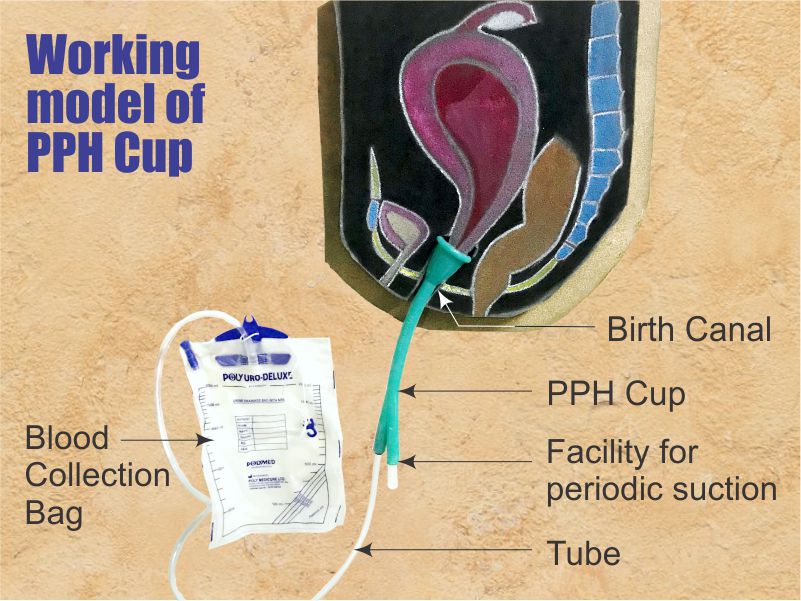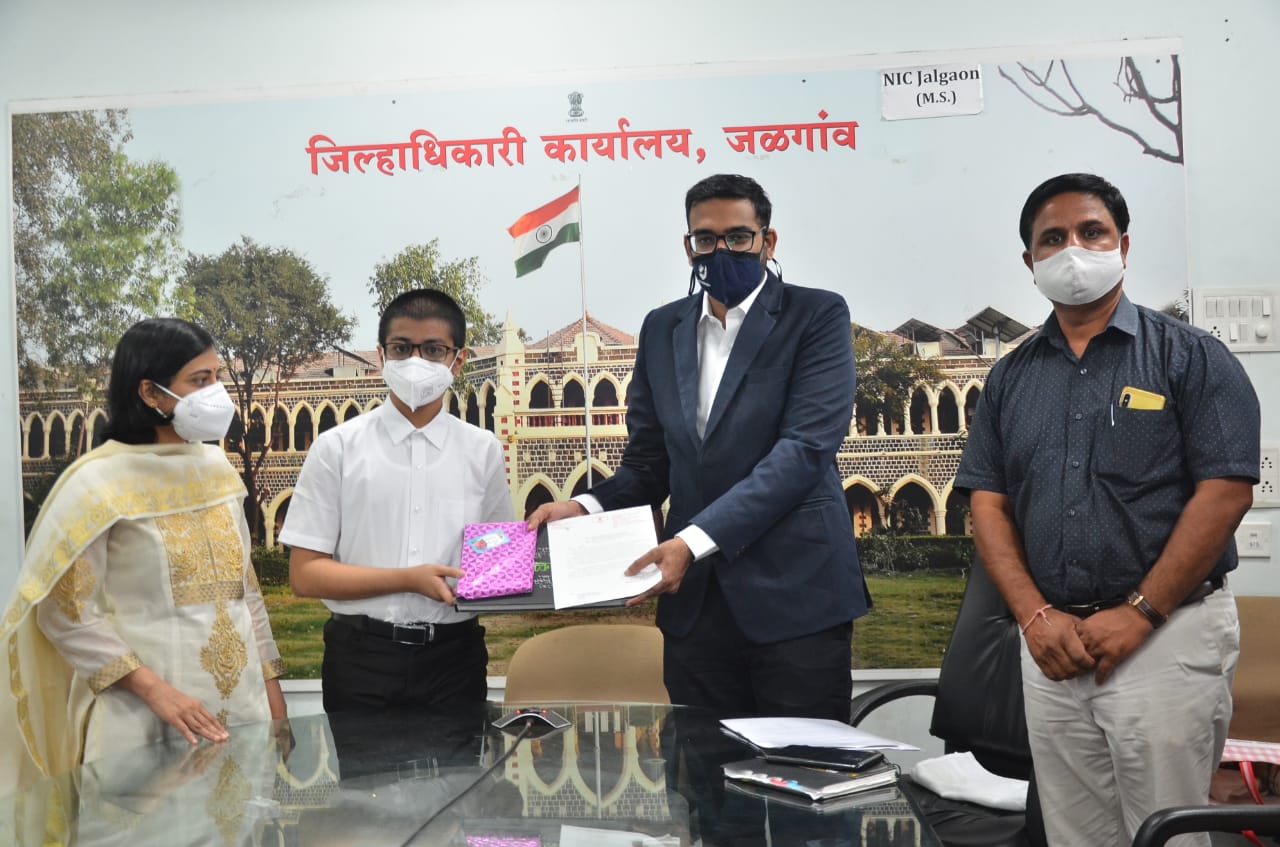Earlier this year, Archit Rahul Patil, a Class 10 student from the Kashinath Palod Public School in Jalgaon, Maharashtra, was felicitated with the Pradhan Mantri Rashtriya Bal Puraskar 2021.
It recognises “children with exceptional abilities and outstanding achievements in the fields of innovation, scholastic achievements, social service, arts and culture and sports”.
Archit’s ‘outstanding achievement’ in the field of innovation was designing and developing his very own postpartum haemorrhage (PPH) cup, which is today helping doctors in places across Maharashtra like Jalgaon, Akola, Sevagram and Aurangabad accurately measure postpartum blood loss in a very short span of time, and thus preventing maternal deaths.
“This particular innovation is life saving. The PPH cup gives doctors the exact amount of blood loss and in real-time. Measuring and estimating the exact volume of blood loss in the event of childbirth is very vital in the management of postpartum hemorrhage, especially during the golden hour. At present, there is no such prevalent method to measure blood loss. My son’s innovation will revolutionise the way post delivery blood loss is monitored in clinical practice and reduce maternal mortality and morbidity,” says Dr Rahul Patil, his father and gynaecologist working at the Vansh Hospital in Jalgaon, in a conversation with The Better India.
According to this paper published in The Lancet, a leading medical journal, “Postpartum haemorrhage (PPH) is the leading cause of maternal mortality worldwide and India accounts for approximately 19 per cent of global maternal deaths, with PPH as the leading cause.” Meanwhile, another explainer goes on to state, “About one in 100 to five in 100 women have postpartum hemorrhage and it is a globally leading cause of maternal morbidity and mortality.”

Innovation Inspired
As the child of Dr Rahul Patil and Dr Archana Patil, who currently work as a gynaecologist and anaesthesiologist, respectively, at the Vansh Hospital in Jalgaon, Archit would find himself in hospitals waiting for his parents while they were attending emergency cases.
“My parents are practicing doctors. When I was little and there was no one at home to look after me, they would sometimes take me to the hospital while attending emergency cases. In the event of a maternal death, I would see how devastated they were about losing their patient. I witnessed the emotional trauma my parents would go through. Feeding my curiosity, I learned from my parents that there is no single/ideal method to measure post delivery blood loss accurately during childbirth. This information gap leads to a delay in diagnosis and the tragic death of mothers in spite of marathon efforts by the medical team. This inspired me to find a solution to the problem,” the 15-year-old says.
It was in Class 6, when he first learnt about menstrual cups and how it collects menstrual blood while working on a science research project on sanitary waste for the Dr. Homi Bhabha Balvaidnyanik Competition. Based on the design and understanding of how menstrual cups work, he came up with the idea of a PPH cup in 2018.
Developing the Product
Earlier, doctors would depend on visual estimation to gauge the amount of blood loss. Since the figures weren’t exact, they couldn’t come up with an accurate diagnosis in time.
It was in 2018 when Archit first discussed his idea for a PPH cup with his parents, while also leveraging their network of medical professionals to help him perfect the device design. He used a spare menstrual cup that belonged to his mother to develop a metal mould and design his first prototype in 2019, which was then presented to obstetricians in his parents’ network.
After taking some feedback from experts, coming up with a few modifications and further developing the metal mould to finalise the PPH cup design, Archit’s parents sent his device to the Indian Drugs Research Laboratory (IDRL) in Pune to test for safety and toxicity in March 2020. Later, three government hospitals and a few private hospitals tested it.
Pilot studies were then organised in government medical colleges (GMC) in Akola and Aurangabad, Mahatma Gandhi Institute of Medical Sciences in Sevagram (Wardha) and private facilities like the Vansh Hospital, Shivam Critical Care and Morya Hospital in Jalgaon. The pilot study was conducted to ascertain the acceptance of his device and its safety and efficacy in clinical practice under supervision of obstetricians at five hospitals.
“Made of medical grade silicone, the PPH cup is inserted into the birth canal before or after caesarean section or after the normal delivery of a child. It has two ports at the end. One is for attaching the blood collection bag, while the other provides a facility for suction to avoid blockage of the system due to blood clots. As we create negative pressure in the suction machine, we can directly suck out the blood clots and that can help prevent atonic postpartum haemorrhage, and thus present a real chance of saving the mother’s life. It has the potential to be the method of choice for quantification of obstetric blood loss globally,” explains Archit.

They also addressed a few design-related concerns that were raised before an ethics committee at the Government Medical College in Akola.
“In the initial prototype, we ran into a couple of problems. There was a larger than required gap between the two ports as a result of which we couldn’t connect them properly. We rectified this problem on the mould. Meanwhile, the other issue was the lack of different sizes of the PPH cup. After rectifying these problems, we successfully tested the PPH again at the same medical colleges and private hospitals on over 200 patients,” he says.
Archit spent a year trying to understand the requirements and the flaws in the existing process before arriving at the final design. The project was presented to many experts digitally and the feedback was encouraging. Further studies are ongoing at the GMC in Akola. The prototype and mould development was partly funded by the Innovation in Science Pursuit for Inspired Research’ (INSPIRE) scheme, a flagship programme of the Department of Science & Technology under the Ministry Of Science And Technology, Government of India.
Today, Archit claims that today nearly 50 hospitals across India are using his PPH cup to save the lives of mothers, given its ability to hasten diagnosis and early medical treatment. Moreover, the device is reusable after autoclave and sterilization, and thus doesn’t add to the burgeoning problem of hazardous medical waste. The net production cost of making this device is about Rs 500 (excluding the developing cost and human hours invested for it).
So far, he has not been contacted by any company from the medical device industry, but is looking forward to collaborating with the Government of India and the IITs to find ways of mass producing his device. Although he has applied for one, Archit hasn’t yet obtained a final patent, but holds intellectual property rights of the product.
“As [an] obstetrician I can recommend [the] Archit PPH Cup to be used for clinical use as it is user-friendly, reusable without any side effects, eco-friendly and eliminates the generation of biomedical sanitary waste…It’s a privilege to recommend Archit PPH Cup in guidelines of Government of India and WHO [since] it will help to reduce maternal mortality and morbidity,” wrote Dr Shyamkumar S Sirsam, Professor and Head of Department of Obstetrics and Gynaecology at the Government Medical College & Hospital, Akola, in a letter dated last year.

Backed by Family
None of this would have been possible without the support of his parents.
“My parents encouraged me to pursue the idea. From networking with professionals from their field to offering financial support needed to take my innovation from an idea to an actual product, they played a pivotal role. Support also came from my school principal Mr Ganesh Patil and science project mentor Mrs Sangeeta Khanna from the Kashinath Palod Public School, Jalgaon. They guided me and provided opportunities to participate in various national and international science fairs, where I was able to present my innovation,” says Archit.
“Our advice for parents of children is to identify the special talent in your child and nurture that potential to the maximum. As parents, we are always supportive of Archit. When he came up with an innovative idea, we encouraged him and provided all the necessary support for incubation till the final product,” says Dr Rahul Patil.
Since coming up with this innovation, the media attention has been incessant.
“But he is a very humble boy and likes to maintain a low profile. Not fond of media attention, he has much bigger aspirations for his academic career and remains focussed on it,” says Dr Patil.
“I want to learn more about artificial intelligence, machine learning and coding. After my high school graduation, I want to get into the best universities in the world. My aim is to represent the India team in the science and mathematics Olympiads,” adds Archit.
Does he have a message for other child innovators like him from around the country?
“Failures and criticism are a part of every journey and I suggest that one should not stop for the fear of criticism. Take it positively, work hard, learn from your mistakes, pursue your goal and never ever stop. After all, this world needs to think of developing many more smart and sustainable solutions for a variety of problems,” he says.
(Edited by Yoshita Rao)
No comments:
Post a Comment